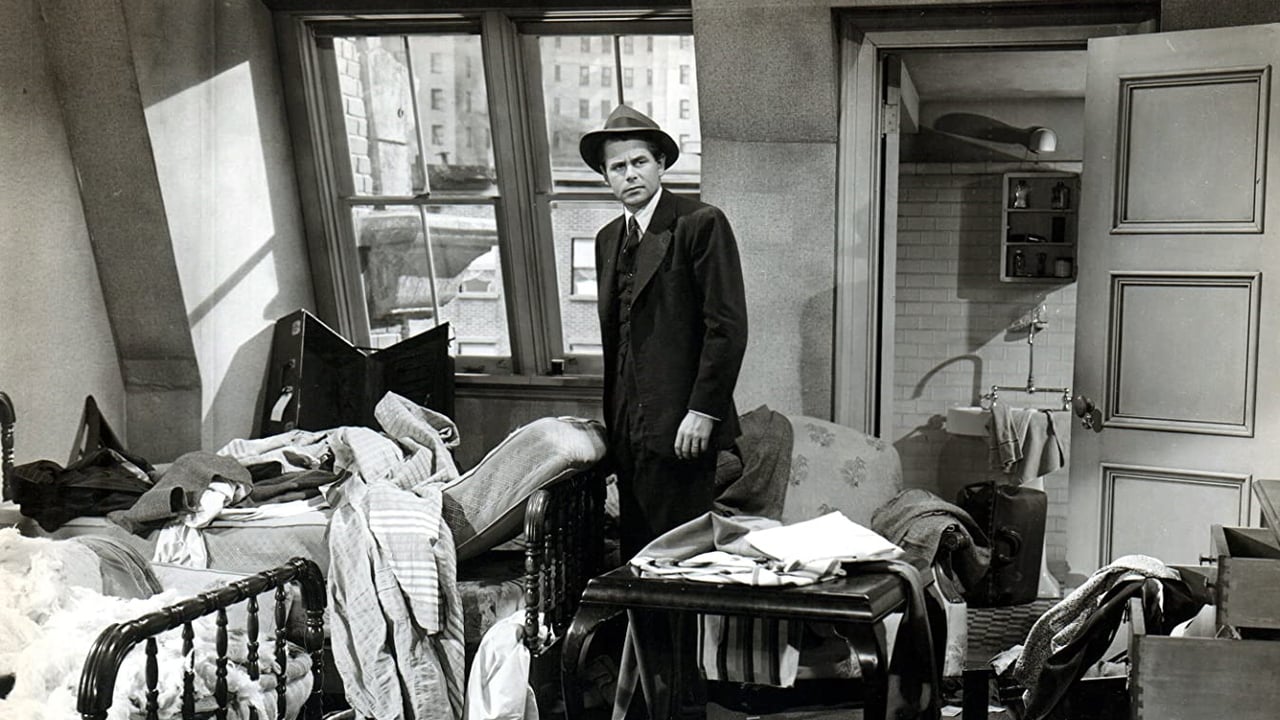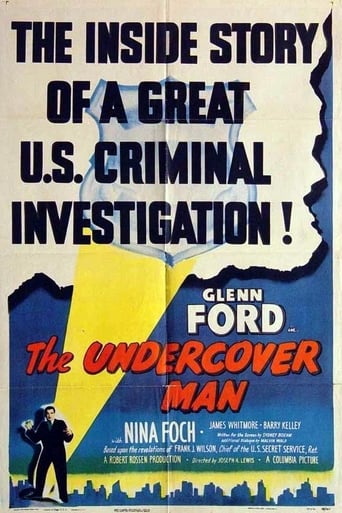

This is a story about some tax people going after a syndicate. I'm not sure what they mean by syndicate - it it a Union or is it a conglomerate of organizations? - whatever it is, it's some kind of gangster run organization. It's basically pretty confusing. There's a guy rather stupidly called the 'Big Fellow' who is the number one baddie and fat lawyer Barry Kelley (John O'Rourke) represents him throughout the film. However, I didn't quite get what his role was until quite far into the movie, and the reason for that is that this is one boring film. I was half an hour into the film and I didn't know what was going on. Things are still not clear after an hour. It's as dull as Glenn Ford - and that's pretty dull! There is no-one that's any good in the cast apart from Barry Kelley for his flamboyance. Glenn Ford (yaaawwnn) put into a film about looking at tax books cannot possibly be a good thing. To add to the misery of it all, they have cast what is quite possibly my most hated family in the whole of film history. Those 3 Italian women representing the different generations are dreadful. The old one bores us silly with a drawn out scene where she talks only in Italian (totally pointless). She looks like a freak. The child is one of the most annoying children ever and is pretty horrible looking as well. And the mother constantly overacts. She does provide the best moment, however, when Glenn Ford first knocks at her door and shows a picture to her to identify. She claims not to know the chap in question but as soon as Ford is sent away, that annoying brat of a girl names the man in question to which the overacting bad actress mother tells her to "forget his name forever" and then gives her a massive slap in the face. Ha ha. SLAP! The film scores a point for that. It almost gets tense at the end in a sequence with Ford and Kelley as they try to outwit the gangster killers but it all reverts to routine humdrum pretty quickly. Those 2 episodes raise this film's score from what would have been a 3/10 to a 4/10. It's boring.
... View MoreThere is a certain lack of style here that represented two of the Director's seminal Film-Noirs, Gun Crazy (1949) and The Big Combo (1955). But there are some very Noir things that make this more interesting than a standard Studio Crime Drama. There is one scene that you would never find in the "regular stuff". An Italian Grandmother is given an extended, importantly motivational scene, and speaks in her Native Italian. It is translated by her Grandchild in English as the G-Men look on with admiration and respect.Such a long and laborious Scene, the Studios would say, is too Ethnic and taxing for the White-Bread target audience. But it turns the main Character around and is touching and unique. You gotta love Film-Noir. Another gripping, gritty scene is the murder of a potential Witness in front of the aforementioned 10 year old child and she looks on yelling Papa, Papa, Papa. Another powerful and offbeat scene.One could quibble and nitpick at some of the corny stuff such as the Leader of the Mob constantly referred to as "The Big Fellow", that's just silly, and the dated text opening, frequently used, that touts the exploits of the Feds as just a bunch of regular Joe's doing their duty for the good of us all.But this is a street level investigation that seems real and the Locations and the Characters are mostly Film-Noir and this one has enough strength to put it in good standing among, if not the best of, the Genre.
... View MoreI'm wondering if there could be anything more boring than an IRS agent. In "The Undercover Man" from 1949, Glenn Ford plays an IRS agent (I doubt any of them are that good-looking) on a case with his cronies, one played by James Whitmore in his film debut. The film is directed by Joseph Lewis, who directed some very impressive noirs. This film has noirish elements.Ford is Frank Warren, who is on the trail of someone called "The Big Fellow" as he attempts to get him on a tax evasion charge. If you haven't guessed, this is based on the Al Capone story. The agents walk around the Italian area of Chicago looking for someone who will talk. However, everyone the agents approach to testify or give evidence ends up dead.These films tend to be pretty dry. This one is enlivened somewhat by Nina Foch as Warren's long-suffering wife, who has had to get used to her husband being away for long periods of time, and by some good scenes. One of the bookkeepers for the Big Fellow, Salvatore Rocco, played by Anthony Caruso, is gunned down in front of his daughter (Joan Lazar). When Warren goes to his funeral, he is called a murderer. Warren is tempted to give up and retire, but it's Rocco's mother who convinces him to keep fighting.Barry Kelley plays the syndicate lawyer, who is sure no one can touch his client. A total slimeball, he does an excellent job in the role. Ford is right for an IRS agent - serious with no sense of humor.There is another little guy in the mob that the IRS agents want, but he and his wife take off. The roles are played by Leo Penn and Patricia Barry. Barry I only recognized by voice. And even if you didn't know anything about Leo Penn, you'd know he was Sean's father just by looking at him.
... View MoreGlenn Ford, with his companions James Whitmore and David Wolfe, are employees of the US Treasury Department assigned to the case of "The Big Fellow" who runs "the syndicate", sometimes called "the mob," all of whose members appear to be living beyond their means. Really, Barry Kelley, their consigliere -- I mean their "lawyer" -- files income tax returns on five thousand a year, yet drives a five-thousand dollar Chrysler and lives in a home that Hugh Hefner would envy.Well, I'll tell you. It's a tough row to hoe. The extortion racket prevails in the city. Eyeball witnesses and their families are threatened. If the threats don't seem to be working, the witnesses die natural deaths full of bullet holes. There are some people involved in the racket, one way or another, who are sympathetic but they're terrified.By dint of much effort, long hours, intrigue, and one or two dangerous meetings, Ford and his pals crack the case and The Big Fellow and all his employees wind up in the slams.There's not a great deal of action. That's not a big problem. But the script is rather routine. There is -- how should I put this? -- there is nothing WRONG with Ford. There is no edge to his character. He doesn't smoke, drink, curse, or act rude. He never raises his voice. Ford loves his devoted wife, plans to leave all the schmutz behind him and retire to a farm. He's dedicated and smart but rather a bore. Compare him to Humphrey Bogart's Sam Spade in "The Maltese Falcon." Everything about the film seems pedestrian. Yet it's not a bad movie. It's diverting in a minor way. But it's possible to imagine a hundred ways in which it could have been improved. They could start by dumping the title that reeks of stereotypy since nobody ever goes undercover.
... View More